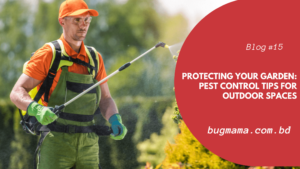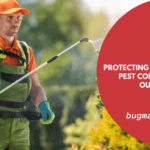
Gardens provide an ideal environment for pests, as they offer a readily available food source and a sheltered habitat. It’s essential to implement pest control measures to ensure the health and vitality of your plants.
Effective pest control not only protects your garden but also prevents the infestation from spreading to neighboring areas.
Identifying Common Garden Pests
Before implementing pest control strategies, it is crucial to identify the specific pests that are causing damage to your garden. Common garden pests include aphids, snails, slugs, caterpillars, beetles, and rodents. Each pest has its own unique characteristics and methods of infestation, so it’s important to correctly identify them to choose the most appropriate control methods.
Preventive Measures for Pest Control
Prevention is the first line of defense against garden pests. By implementing preventive measures, you can significantly reduce the chances of a pest infestation. Some preventive measures include:
- Regularly inspecting your plants for signs of pests or diseases.
- Maintaining proper plant spacing to minimize overcrowding.
- Removing weeds that can attract pests or provide hiding spots.
- Practicing good garden hygiene by cleaning up fallen leaves and debris.
- Providing adequate air circulation to prevent the buildup of moisture, which can attract pests.
Organic Pest Control Methods
Organic pest control methods are an eco-friendly approach to managing garden pests. These methods utilize natural substances and biological controls to minimize pest populations. Some effective organic pest control methods include:
- Neem oil: Extracted from the neem tree, neem oil acts as a natural pesticide and repels a wide range of pests.
- Beneficial nematodes: These microscopic worms feed on pests like grubs, slugs, and caterpillars, reducing their populations.
- Garlic spray: Mixing crushed garlic cloves with water and spraying it on plants can deter aphids and other pests.
- Beer traps: Placing shallow containers filled with beer in the garden attracts and drowns slugs and snails.
Chemical Pest Control Options
In some cases, chemical pest control options may be necessary to combat severe infestations. However, it’s important to use these methods judiciously and follow the instructions provided. Some commonly used chemical pest control options include:
- Insecticidal soaps: These soaps target soft-bodied insects like aphids, mites, and whiteflies and disrupt their cellular membranes, leading to their demise.
- Biological insecticides: These products contain naturally occurring bacteria, fungi, or viruses that specifically target certain pests without harming beneficial insects.
- Synthetic pesticides: These chemical compounds are designed to kill or repel a wide range of pests. However, they should be used as a last resort and with caution due to their potential environmental impact.
Companion Planting for Natural Pest Control
Companion planting involves strategically placing plants together to enhance growth and repel pests. Certain plants release natural compounds that act as repellents or attract beneficial insects that prey on garden pests. Some popular companion plants for natural pest control include:
- Marigolds: Their strong scent repels aphids, nematodes, and whiteflies.
- Basil: This herb repels mosquitoes and flies, while also enhancing the growth of neighboring plants.
- Nasturtiums: Their bright flowers attract aphids away from other plants, acting as sacrificial companions.
Beneficial Insects: Nature’s Pest Controllers
Nature provides us with an army of beneficial insects that can help control garden pests. Introducing these beneficial insects into your garden can establish a natural balance and reduce the need for chemical pesticides. Some common beneficial insects include:
- Ladybugs: These voracious predators feed on aphids, mealybugs, and mites.
- Lacewings: The larvae of lacewings consume aphids, thrips, and other soft-bodied pests.
- Praying mantises: Known for their predatory nature, praying mantises feed on a wide range of insects, including caterpillars, beetles, and grasshoppers.
Using Physical Barriers for Pest Prevention
Physical barriers provide a physical barrier between pests and your plants, preventing infestations. Some effective physical barriers for pest prevention include:
- Row covers: These lightweight fabrics allow sunlight and moisture to pass through while keeping pests out.
- Netting: Placing netting around fruit trees or vegetable patches can deter birds and other animals from accessing the produce.
- Copper tape: Wrapping copper tape around pots or planters acts as a barrier against slugs and snails.
Managing Pest Infestations
If despite your best efforts, your garden experiences a pest infestation, it’s important to take immediate action to minimize damage. Some effective strategies for managing pest infestations include:
- Handpicking: Carefully remove pests by hand and drop them into a bucket of soapy water to drown them.
- Traps: Set up traps to capture pests like slugs, snails, and rodents.
- Pruning: Remove heavily infested plant parts to prevent the spread of pests.
- Natural predators: Attract natural predators like birds or bats to your garden by providing suitable habitats, such as birdhouses or bat boxes.
Tips for Dealing with Specific Garden Pests
Different pests require different approaches for effective control. Here are some specific tips for dealing with common garden pests:
- Aphids: Blast them off plants with a strong stream of water or introduce ladybugs to feed on them.
- Slugs and snails: Set up beer traps or create barriers with crushed eggshells or diatomaceous earth to deter them.
- Caterpillars: Handpick them off plants or use biological insecticides containing Bacillus thuringiensis (Bt).
- Beetles: Shake infested plants onto a sheet and remove the beetles by hand or use insecticidal soap.
Maintaining Garden Health to Minimize Pest Attacks
Maintaining overall garden health is key to preventing pest attacks. Healthy plants are better equipped to withstand pest infestations. Here are some tips for maintaining garden health:
- Provide proper watering: Avoid overwatering orcreating waterlogged conditions, as this can weaken plants and make them more susceptible to pests.
- Fertilize appropriately: Use organic fertilizers to provide essential nutrients to your plants and promote their overall health.
- Prune regularly: Remove dead or diseased plant parts to prevent the spread of pests and diseases.
- Rotate crops: Avoid planting the same crops in the same location year after year, as this can lead to a buildup of pests and diseases in the soil.
- Monitor and act promptly: Regularly inspect your plants for any signs of pest damage or disease. Take immediate action if you notice any issues to prevent them from spreading.
FAQs
What is the best way to prevent pest infestations in my garden?
Implement preventive measures such as regular inspections, maintaining proper plant spacing, removing weeds, and practicing good garden hygiene.
Are organic pest control methods effective?
Yes, organic pest control methods can be highly effective in managing garden pests while minimizing the impact on the environment.
How can I attract beneficial insects to my garden?
Planting flowers and herbs that attract beneficial insects, such as ladybugs and lacewings, can help establish a natural balance in your garden.
When should I consider using chemical pesticides?
Chemical pesticides should be used as a last resort and only when severe pest infestations cannot be managed through other means.
How often should I inspect my plants for pests?
Regularly inspect your plants, at least once a week, to catch any pest infestations early and take appropriate action.
Conclusion
Protecting your garden from pests is essential for maintaining its beauty and ensuring the healthy growth of your plants.
By implementing preventive measures, using organic pest control methods, and incorporating natural solutions like companion planting and beneficial insects, you can effectively manage pest infestations.
Remember to maintain garden health and take prompt action when needed. With these pest control tips, you can create a thriving and pest-free outdoor space to enjoy.
